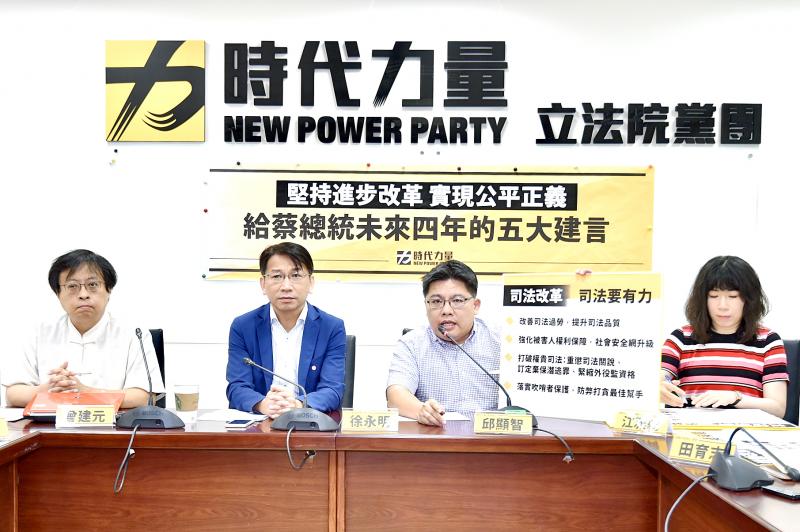President Tsai Ing-wen (蔡英文) should launch a series of reforms during her second term, focusing on amending the Constitution and housing issues, the New Power Party (NPP) said yesterday.
As Tsai is set to be sworn in this morning for her second term, the party and several experts have made policy proposals on constitutional amendments, judicial reforms, housing issues, the media and technology, NPP members said at a news conference in Taipei.
The reforms it is proposing are the promises that Tsai had made before starting her first term, so she should fulfill those promises in her second term, NPP Chairman Hsu Yung-ming (徐永明) said.

Photo: Tu Chien-jung, Taipei Times
The NPP hopes that the Constitution could be amended so that the voting age could be lowered from 20 to 18, Hsu said.
Even though the Democratic Progressive Party (DPP) controls more than half of the Legislative Yuan’s seats, Tsai would still face enormous challenges in amending the Constitution, considering the conflicts between the DPP and opposition parties, he said.
“If the public has reached a consensus that the voting age should be 18, the president has the responsibility to forge dialogues between all parties and helping all parties reach a consensus,” Hsu said.
NPP legislative caucus whip Chiu Hsien-chih (邱顯智) said Tsai should try to enforce the conclusions reached at the National Conference on Judicial Reforms, including enhancing the quality of the judicial system and improving the work environment for judges, prosecutors and court marshals.
Housing right advocate Peng Yang-kae (彭揚凱) said Tsai was heading in the right direction when she proposed housing reforms four years ago, but she did not deliver.
She should quickly deliver a new system for registering the actual selling price of real estate and levy higher taxes on homes not lived in by their owners, Peng said.

Travel agencies in Taiwan are working to secure alternative flights for travelers bound for New Zealand for the Lunar New Year holiday, as Air New Zealand workers are set to strike next week. The airline said that it has confirmed that the planned industrial action by its international wide-body cabin crew would go ahead on Thursday and Friday next week. While the Auckland-based carrier pledged to take reasonable measures to mitigate the impact of the workers’ strike, an Air New Zealand flight arriving at Taipei from Auckland on Thursday and another flight departing from Taipei for Auckland on Saturday would have to

The manufacture of the remaining 28 M1A2T Abrams tanks Taiwan purchased from the US has recently been completed, and they are expected to be delivered within the next one to two months, a source said yesterday. The Ministry of National Defense is arranging cargo ships to transport the tanks to Taiwan as soon as possible, said the source, who is familiar with the matter. The estimated arrival time ranges from late this month to early next month, the source said. The 28 Abrams tanks make up the third and final batch of a total of 108 tanks, valued at about NT$40.5 billion

A group from the Taiwanese Designers in Australia association yesterday represented Taiwan at the Midsumma Pride March in Melbourne. The march, held in the St. Kilda suburb, is the city’s largest LGBTQIA+ parade and the flagship event of the annual Midsumma Festival. It attracted more than 45,000 spectators who supported the 400 groups and 10,000 marchers that participated this year, the association said. Taiwanese Designers said they organized a team to march for Taiwan this year, joining politicians, government agencies, professionals and community organizations in showing support for LGBTQIA+ people and diverse communities. As the first country in Asia to legalize same-sex

MOTIVES QUESTIONED The PLA considers Xi’s policies toward Taiwan to be driven by personal considerations rather than military assessment, the Epoch Times reports Chinese President Xi Jinping’s (習近平) latest purge of the Chinese People’s Liberation Army (PLA) leadership might have been prompted by the military’s opposition to plans of invading Taiwan, the Epoch Times said. The Chinese military opposes waging war against Taiwan by a large consensus, putting it at odds with Xi’s vision, the Falun Gong-affiliated daily said in a report on Thursday, citing anonymous sources with insight into the PLA’s inner workings. The opposition is not the opinion of a few generals, but a widely shared view among the PLA cadre, the Epoch Times cited them as saying. “Chinese forces know full well that